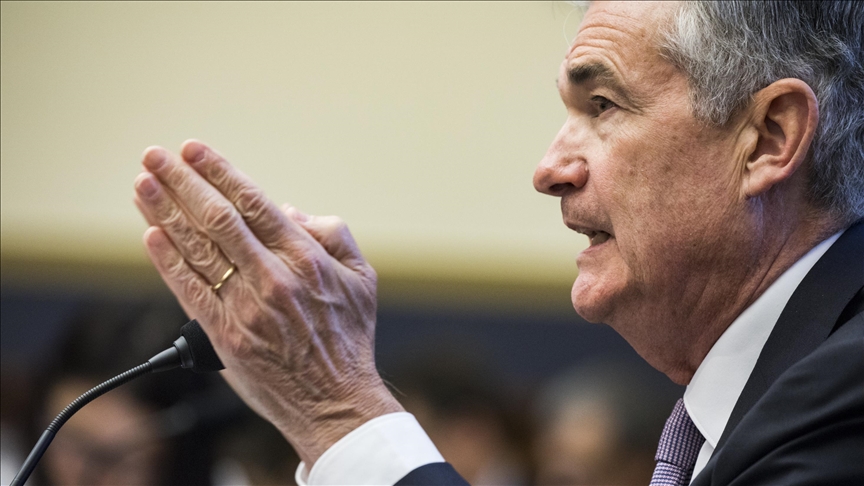

By Anadolu Agency
ISTANBUL
US Federal Chair Jerome Powell said Tuesday that the American economy has made considerable progress toward the Fed’s 2% inflation goal in the last two years.
He said labor market conditions have cooled, while remaining strong, and the risks to achieving the Fed’s employment and inflation goals are coming into better balance.
“Recent indicators suggest that the U.S. economy continues to expand at a solid pace,” Powell said in his semiannual Monetary Policy Report to Congress. “Gross domestic product growth appears to have moderated in the first half of this year following impressive strength in the second half of last year.”
“Private domestic demand remains robust, however, with slower but still-solid increases in consumer spending. We have also seen moderate growth in capital spending and a pickup in residential investment so far this year,” he said in testimony before the Senate Committee on Banking, Housing, and Urban Affairs in Washington, D.C.
The Fed chair added that improving supply conditions have supported resilient demand and the strong performance of the American economy in the last year.
Labor market
Powell said several indicators suggest that conditions in the labor market have returned to where they stood on the eve of the coronavirus pandemic — strong, but not overheated.
The unemployment rate, meanwhile, has moved higher but was still at a low level of 4.1% in June, while payroll gains averaged 222,000 jobs per month in the first half of 2024.
“Strong job creation over the past couple of years has been accompanied by an increase in the supply of workers,” said Powell. “Nominal wage growth has eased over the past year. The strong labor market has helped narrow long-standing disparities in employment and earnings across demographic groups.”
Inflation
Powell said total personal consumption expenditures (PCE) prices, which is the Fed’s preferred inflation indicator, rose 2.6% in the 12 months ending in May. Core PCE prices, which exclude the volatile food and energy categories, also increased 2.6%.
“After a lack of progress toward our 2 percent inflation objective in the early part of this year, the most recent monthly readings have shown modest further progress,” he said. “Longer-term inflation expectations appear to remain well anchored, as reflected in a broad range of surveys of households, businesses, and forecasters, as well as measures from financial markets.”
Powell noted that the Fed has maintained the target range for the federal funds rate at 5.25% to 5.5% since July 2023, and reiterated that the Federal Open Market Committee (FOMC) does not expect it will be appropriate to reduce the target range for the federal funds rate until it has “gained greater confidence” that inflation is moving sustainably toward 2%.
“Incoming data for the first quarter of this year did not support such greater confidence. The most recent inflation readings, however, have shown some modest further progress, and more good data would strengthen our confidence that inflation is moving sustainably toward 2%,” he said.
Monetary policy
The Fed chair said the FOMC continues to make decisions meeting by meeting.
“We know that reducing policy restraint too soon or too much could stall or even reverse the progress we have seen on inflation,” he said. “Reducing policy restraint too late or too little could unduly weaken economic activity and employment.”
“At the same time, in light of the progress made both in lowering inflation and in cooling the labor market over the past two years, elevated inflation is not the only risk we face,” he added.
Powell said the FOMC will continue to carefully assess incoming macroeconomic data and their implications for the evolving outlook of the economy, the balance of risks and the appropriate path of monetary policy.
He said labor market conditions have cooled significantly compared to two years ago.
“This is no longer an overheated economy. This is an economy that is back to where it was more or less before the pandemic. And that was a strong labor market, not an overheated labor market,” he said.
Powell said the FOMC is “well aware” that it faces two-sided risks.
“If we loosen (monetary) policy too late or too little, we could hurt economic activity. If we loosen policy too much or too soon, then we can undermine the progress on inflation. So, we’re very much balancing those two risks. That’s really the essence of what we’re thinking about these days,” he explained.
The Fed chair said it does not seem likely that the next monetary policy move would be an interest rate increase, according to the latest summary of the Fed’s projections, although the central bank does not take it completely off the table.
“The likely direction seems to be as we make more progress on inflation, and as the labor market remains strong, we’ll begin to loosen policy at the right moment,” he added.
When asked about the effect of tariff increases on consumer prices and the economy, Powell said the Fed does not comment on campaign-type information and trade policy.
We use cookies on our website to give you a better experience, improve performance, and for analytics. For more information, please see our Cookie Policy By clicking “Accept” you agree to our use of cookies.
Read More